Related Research Articles

The Irish Republican Army was an Irish republican revolutionary paramilitary organisation. The ancestor of many groups also known as the Irish Republican Army, and distinguished from them as the "Old IRA", it was descended from the Irish Volunteers, an organisation established on 25 November 1913 that staged the Easter Rising in April 1916. In 1919, the Irish Republic that had been proclaimed during the Easter Rising was formally established by an elected assembly, and the Irish Volunteers were recognised by Dáil Éireann as its legitimate army. Thereafter, the IRA waged a guerrilla campaign against the British occupation of Ireland in the 1919–1921 Irish War of Independence.

The Irish War of Independence or Anglo-Irish War was a guerrilla war fought in Ireland from 1919 to 1921 between the Irish Republican Army and British forces: the British Army, along with the quasi-military Royal Irish Constabulary (RIC) and its paramilitary forces the Auxiliaries and Ulster Special Constabulary (USC). It was part of the Irish revolutionary period.
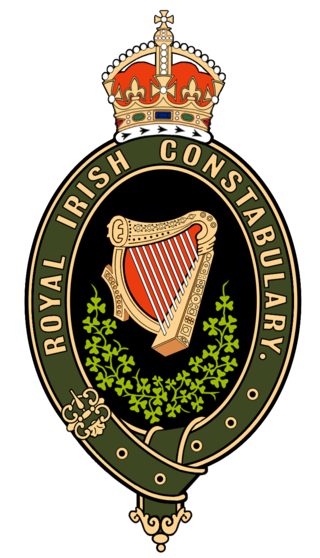
The Royal Irish Constabulary was the police force in Ireland from 1822 until 1922, when all of the country was part of the United Kingdom. A separate civic police force, the unarmed Dublin Metropolitan Police (DMP), patrolled the capital and parts of County Wicklow, while the cities of Derry and Belfast, originally with their own police forces, later had special divisions within the RIC. For most of its history, the ethnic and religious makeup of the RIC broadly matched that of the Irish population, although Anglo-Irish Protestants were overrepresented among its senior officers.

The Connaught Rangers was an Irish line infantry regiment of the British Army formed by the amalgamation of the 88th Regiment of Foot and the 94th Regiment of Foot in July 1881. Between the time of its formation and Irish independence, it was one of eight Irish regiments raised largely in Ireland. Its home depot was in Galway. It was disbanded following the establishment of the independent Irish Free State in 1922, along with the other five regiments that had their traditional recruiting grounds in the counties of the new state.
Events from the year 1922 in Ireland.

Major Henry Kelly VC, MC & Bar was an English recipient of the Victoria Cross, the highest and most prestigious award for gallantry in the face of the enemy that can be awarded to British and Commonwealth forces.
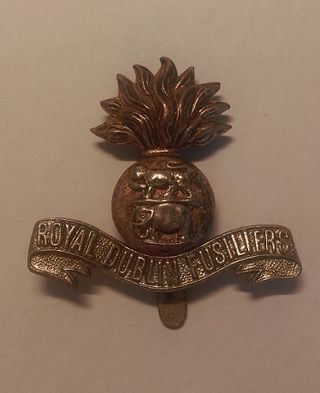
The Royal Dublin Fusiliers was an infantry regiment of the British Army created in 1881 and disbanded in 1922. It was one of eight 'Irish' regiments of the army which were raised and garrisoned in Ireland, with the regiment's home depot being located in Naas. The regiment was created via the amalgamation of the Royal Bombay Fusiliers and Royal Madras Fusiliers, two army regiments stationed in India, with militia units from Dublin and Kildare as part of the Childers Reforms. Both battalions of the regiment served in the Second Boer War.

The Royal Irish Regiment, until 1881 the 18th Regiment of Foot, was an infantry regiment of the line in the British Army, first raised in 1684. Also known as the 18th Regiment of Foot and the 18th Regiment of Foot, it was one of eight Irish regiments raised largely in Ireland, its home depot in Clonmel. It saw service for two and a half centuries before being disbanded with the Partition of Ireland following establishment of the independent Irish Free State in 1922 when the five regiments that had their traditional recruiting grounds in the counties of the new state were disbanded.
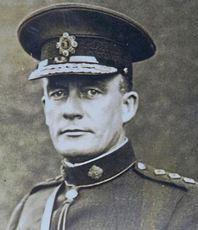
Eamon "Ned" Broy was successively a member of the Dublin Metropolitan Police, the Irish Republican Army, the National Army, and the Garda Síochána of the Irish Free State. He served as Commissioner of the Gardaí from February 1933 to June 1938. He later served as president of the Olympic Council of Ireland for fifteen years.
Events during the year 1922 in Northern Ireland.
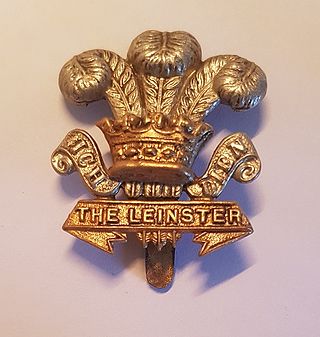
The Prince of Wales's Leinster Regiment (Royal Canadians) was an infantry regiment of the line in the British Army, formed in 1881 by the amalgamation of the 100th (Prince of Wales's Royal Canadian) Regiment of Foot and the 109th Regiment of Foot (Bombay Infantry). The 100th Foot was first raised in 1858 and the 109th was first raised in 1853. Between the time of its formation and Irish independence, it was one of eight Irish regiments raised largely in Ireland, with its Birr Barracks home depot in Birr. It was disbanded with the Partition of Ireland following establishment of the independent Irish Free State in 1922 when the five regiments that had their traditional recruiting grounds in the counties of the new state were disbanded.
The Listowel mutiny occurred during the Irish War of Independence when Royal Irish Constabulary officers under the command of County Inspector O'Shea refused to be relocated out of their rural police station in Listowel, County Kerry and moved to other areas.
The "German Plot" was a spurious conspiracy that the Dublin Castle administration in Ireland claimed existed between the Sinn Féin movement and the German Empire in May 1918. Allegedly, the two factions conspired to start an armed insurrection in Ireland during World War I, which would have diverted the British war effort. The administration used these claims to justify the internment of Sinn Féin leaders, who were actively opposing attempts to introduce conscription in Ireland.

During World War I (1914–1918), Ireland was part of the United Kingdom of Great Britain and Ireland, which entered the war in August 1914 as one of the Entente Powers, along with France and Russia. In part as an effect of chain ganging, the UK decided due to geopolitical power issues to declare war on the Central Powers, consisting of Germany, Austria-Hungary, the Ottoman Empire, and Bulgaria.

James Emmet Dalton MC was an Irish soldier and film producer. He served in the British Army in the First World War, reaching the rank of captain. However, on his return to Ireland he became one of the senior figures in the Dublin Brigade of the guerrilla Irish Republican Army which fought against British rule in Ireland.

The National Army, sometimes unofficially referred to as the Free State army or the Regulars, was the army of the Irish Free State from January 1922 until October 1924. Its role in this period was defined by its service in the Irish Civil War, in defence of the institutions established by the Anglo-Irish Treaty. Michael Collins was the army's first commander-in-chief until his death in August 1922.
G (detective) Division was a plainclothes divisional office of the Dublin Metropolitan Police concerned with detective police work. Divisions A to F of the DMP were uniformed sections responsible for particular districts of the city.

The revolutionary period in Irish history was the period in the 1910s and early 1920s when Irish nationalist opinion shifted from the Home Rule-supporting Irish Parliamentary Party to the republican Sinn Féin movement. There were several waves of civil unrest linked to Ulster loyalism, trade unionism, and physical force republicanism, leading to the Irish War of Independence, the creation of the Irish Free State, the Partition of Ireland, and the Irish Civil War.
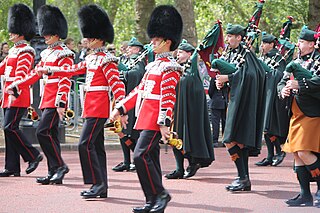
Irish in the British Armed Forces refers to the history of Irish people serving in the British Armed Forces. Ireland was then as part of the United Kingdom from 1800 to 1922 and during this time in particular many Irishmen fought in the British Army. Different social classes joined the military for various reasons, including the Anglo-Irish officers who thoroughly wished to support the "mother country", while others, typically poorer Irish Catholics, did so to support their families or seeking adventure.
Ian Knight is a British historian and writer, specialising in Anglo-Zulu and Boers wars.
References
- ↑ Bloomsbury.Domain.Store.Site. "Peter Cottrell: Bloomsbury Publishing (US)". www.bloomsbury.com. Retrieved 6 December 2023.
- ↑ "Viewing Page 64 of Issue 54265". London-gazette.co.uk. 29 December 1995.
- ↑ "Gazette Website: PDF Navigator". London-gazette.co.uk. Retrieved 10 February 2012.
- ↑ "Osprey Publishing - Military History Books - Search Results". Archived from the original on 13 June 2011. Retrieved 4 December 2010.
- ↑ "Military History Books – Author Profile: Peter Cottrell". Osprey Publishing. Archived from the original on 5 March 2012. Retrieved 10 February 2012.
- ↑ "Osprey Publishing - Military History Books - Search Results". Archived from the original on 13 June 2011. Retrieved 4 December 2010.
- ↑ "article on CIMIC operations in Iraq, 2003" (PDF). Archived from the original (PDF) on 8 April 2010.
- ↑ "Viewing Page 10612 of Issue 55627". London-gazette.co.uk. 5 October 1999. Retrieved 10 February 2012.
- ↑ "Viewing Page 6065 of Issue 55142". London-gazette.co.uk. 1 June 1998. Retrieved 10 February 2012.